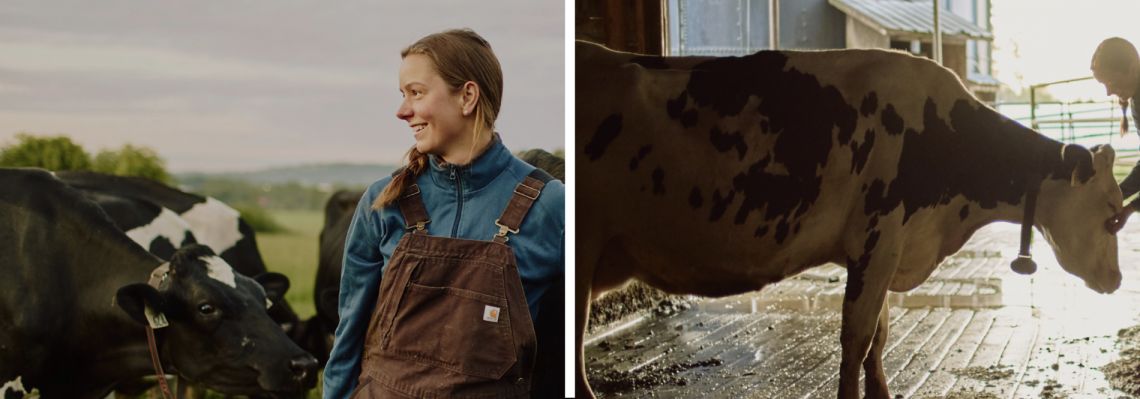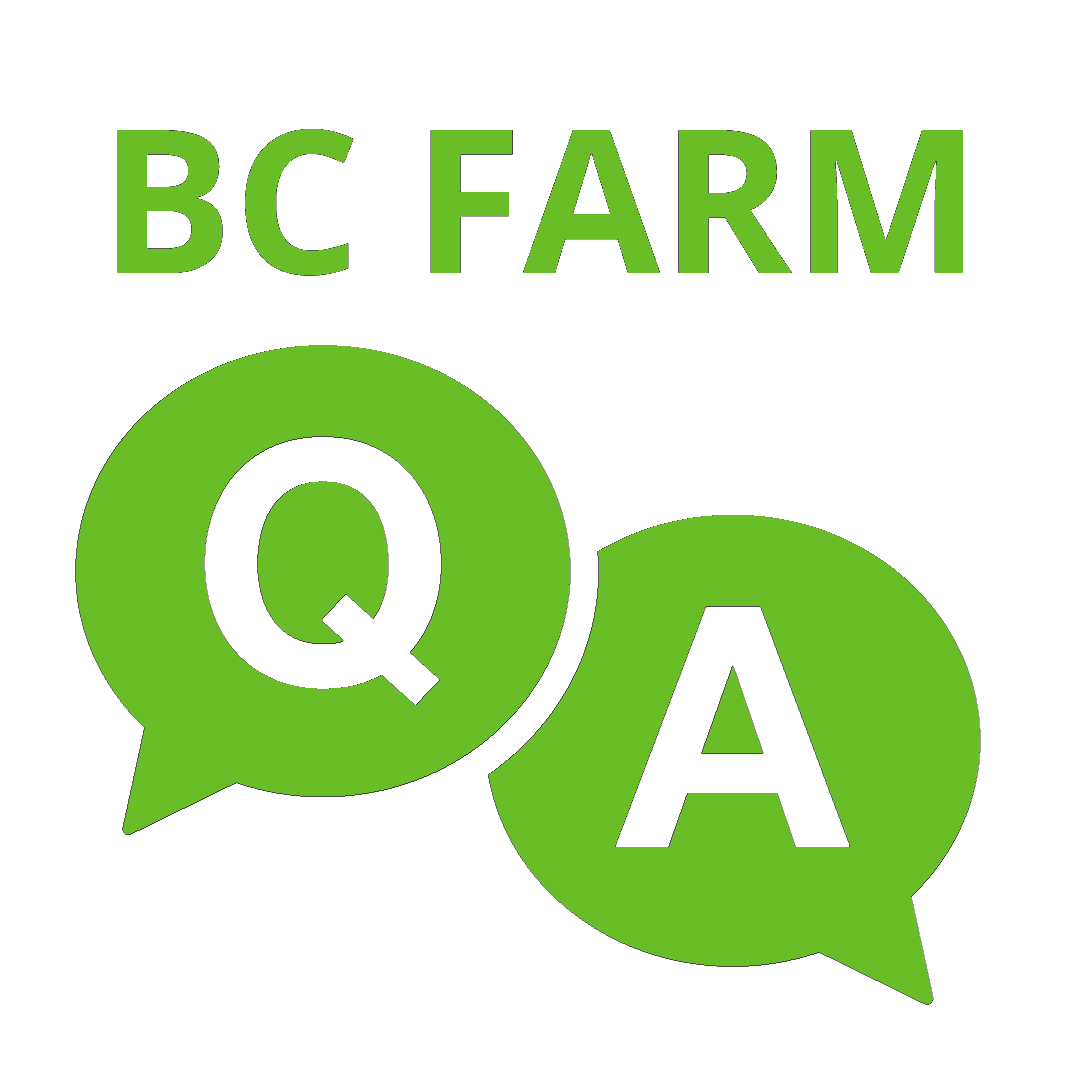
BC Farm Q & A - Brackenhurst Farm
The newest feature in our BCAITC BC Farm Q & A Series showcases Brackenhurst Farm, a multi-generation dairy farm in North Saanichton, BC. Learn about this amazing farm and its team’s passion for everything agriculture!
About
Brackenhurst Farm is a 4th generation dairy farm that has been a part of the Vancouver Island farming community for decades. Originally located in East Sooke (now known as Aylard Farm Park), the farm relocated to its current North Saanichton location in 1930. The farm is operated by Mickey Aylard and her extended family, who work (and enjoy living life) on the farm on a daily basis.
Brackenhurst Farm encompasses over 300 acres and is home to 100 dairy cows. The farm produces 1.3 million litres of delicious milk every year (enough to fulfill the annual milk consumption needs of over 20,000 people)! Additionally, the farm is host to 200 heifers and steers as well as grass, barley, and corn crops and a fun hobby farm.
The farm is a big proponent of innovation and technology. It operates two robotic milking systems that automatically milk cows on schedule (robotic arms attach a vacuum pump to the cow to collect milk while data about the cow’s health and milk production is recorded). The farm also uses the latest technology in refrigeration to keep the cow's milk cold. The farm team is also looking at installing solar panels in the future to generate self-producing sustainable energy!
The team at Brackenhurst Farm is truly grateful for the opportunity to work as farmers! Mickey and her family share their love of farming with others - encouraging youth to consider rewarding future careers as farmers and showcasing the importance of agriculture to BC's food system. Mickey volunteers her time with a variety of organizations - she is President of the Island Milk Producers Association, she has served on the Board of Directors for BC Dairy since 2018, and she has even been featured as a guest speaker in BCAITC's cook-along events! The Brackenhurst Farm team has also been featured in several media publications, advocating for farming in our province. Continue reading to find out more about this exciting BC farm.
.jpg)
Q&A with Mickey Aylard, Owner-Operator of Brackenhurst Farm
Q: When and how did your farm get started? A: My great grandfather started milking cows on the farm in 1930. We are still using the barns that he built, and my parents still live in the house that he built! I am the 4th generation.
Q: How many dairy cows do you have on your farm and how much milk do you produce each year? A: We milk about 100 cows, but raise our own heifers and some steers as well, so we have about 300 cattle on the farm. We produce about 1.3 million litres of milk every year.
Q: Do you have any other animals on your farm? Other crops? A: We have a few chickens that we collect eggs from (just for personal consumption!) as well as 3 dogs and several barn cats (all who are a part of the family!) We grow our own crops for the cows, growing about 200 acres of grass and 40 acres of corn. We also have a fairly substantial vegetable garden, which is a hobby that the whole family enjoys and takes part in! We love to grow peas, carrots, beets, beans, asparagus, Brussel sprouts, broccoli, and cauliflower, lots of squash, tomatoes, peppers, onions, garlic, and strawberries, and raspberries… just to name a few of the things we grow!
Q: What sustainability practices do you incorporate into your farm? A: We do everything we can to farm sustainably. It's particularly important to me because my family has already been farming this land for over 90 years, and if the next 4 generations want to continue to farm here, I want to preserve the land so that it's available to them to do so! We do this by doing rotational grazing, where the cows are on new grass every 12 hours, so it minimizes compaction, and the grass has time to grow back between feedings (cows rotate through pastures every 2-4 weeks, depending on the time of year/how fast the grass is growing). We also use collected rainwater to irrigate our crops; we don’t pump water out of the ground. We use all our manure (some call it waste, but it's actually a nutrient!) on our crops which help the crop to grow. We use spent grains from the local brewery as grain in our cow ration, minimizing the amount of grain we need to bring in from other parts of Canada (grain is the only feedstuff we cannot grow on our farm). We still have undeveloped, wild areas on the farm (about 20 acres) that promote biodiversity in our area and on our farm.
Q: What is new and exciting with your farm? A: We are milking with robot milkers, which gives the cows the ability to all be on their own schedule. At any time of day, each individual cow can choose to be milked, eat, sleep, drink water, or go outside to pasture (during the right times of the year). The other new and exciting part of our farm is that I just had my first child which means there is a possibility of a 5th generation!
Q: What is your busiest time of the year and why? A: April-September are our busiest times of the year. We are starting to pasture, so there is always lots of fencing to prepare and set up, as well as getting ready to begin planting and harvesting crops. Irrigation is another very busy job in the summer! We need to make sure that we are keeping the irrigation going all day and night during the dry summer months. There is always a never-ending list of things to do all year round, but these months, in particular, there is more that needs to be done so we can ensure we have enough feed for the animals all winter long! The good weather usually encourages more outside improvement projects as well, adding to the busy-ness of summer!
Q: What is the most challenging part of operating your farm? A: This is a tough question, especially as I look to the next question! The most challenging parts of operating the farm are often the most rewarding. It is difficult missing events, and constantly saying no to hanging out with friends/family because I have to work, but after even a long day of work, it is always so gratifying. Because much of the work is both physically challenging and can be mentally -draining, when I’ve accomplished a difficult day it's very satisfying. There is an instant-gratification.
Q: What is the most rewarding part of operating your farm? A: Finishing a long day of work, but the long day being very productive and accomplishing my goals! For example, it was a goal of mine about 7 years ago to have robotic milkers, and 3 years ago we accomplished that. It is rewarding looking back and seeing how far we have come as a family business!
Q: What industry publications do you read/follow to learn more about farming and business? A: I will read/follow pretty much anything I can get! I find FCC often has good seminars, as well as the Ministry of Agriculture, Food, and Fisheries. I also really enjoy following other dairy farmers on social media – I find it's an easy way to connect with other producers across the country and share ideas and learn about different ways to farm!
Q: What advice do you have for young agriculture entrepreneurs? A: Find your passion. If you do what you love, then it all comes easier and falls into place. It can be hard to find exactly what it is you love, maybe it's not the whole farming picture, maybe it's just one specific part of farming or involvement in agriculture, and explore that. Nurture that passion and you will find everything comes easier.
Q: Which are the top 3 soft skills do you think are essential to being a successful dairy farmer? A: (1) Creative problem-solving, (2) integrity, and (3) work ethic.
Do you want to learn more about Brackenhurst Farm? Find it on Instagram or Facebook!

 |
|
About BC Farm Q & A: Readers can learn about day-to-day life on farms, the business of farming, and the rewards and challenges of farming through our BCAITC BC Farm Q & A series. The profiles provide knowledge and inspiration for future generations of agriculture enthusiasts. Does your business want to be featured? Contact our Communications Coordinator, meghan@aitc.ca for information. |
